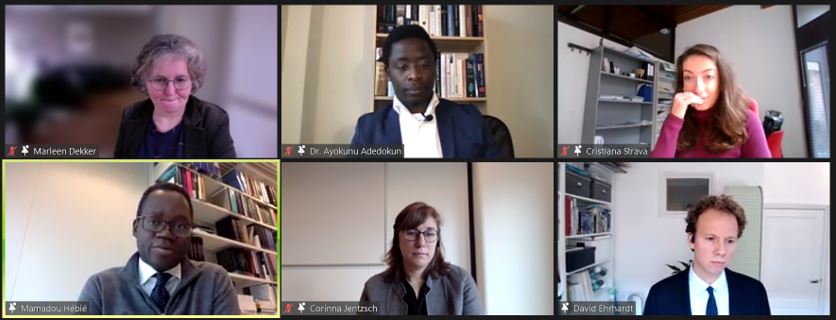Report LeidenASA Annual Meeting: Decolonising academic education and research

The Leiden African Studies Assembly (LeidenASA) held its Annual Meeting on 6 December 2021 – online, because of the COVID-19 restrictions. LeidenASA is the network of Leiden based Africanist researchers. A lively panel discussion focused on decolonising academic education and research.
Leiden University has about 120 scholars who work on Africa-related research and education, based at the various faculties or the African Studies Centre Leiden. David Ehrhardt, Chair of LeidenASA and associate professor at Leiden University College, welcomed all participants to the online Annual Meeting. In her opening speech, Annetje Ottow, President of Leiden University’s Executive Board, stated that engagement with Africa has been at the forefront of recent discussions about the university’s strategic plan for the coming years. Africa will be one of the key focus areas within the university’s regional approach. She invited reflections on how to engage, self-critically, with African partners and on how to foster synergies with African partners. She stressed the need to ensure that Leiden University provides a home to African students and scholars, a place where inquisitive minds can inspire one another in a safe and inclusive environment. Professor Ottow also highlighted that LeidenASA is well placed to assist and advise the Board in further exploring the strategic focus.
Subsequently, LeidenASA member Maria Yazdanbakhsh (LUMC) shared her experiences with international, in particular African, cooperation. In a video message she spoke about long-term sustainable collaborations with partners in the global south. She stressed the importance of considering the scientific interests on both sides, to build lasting and respectful relationships, and to have partners who are well embedded in the local community. Collaborations require a long-term investment. A good starting point for collaborations lies in (joint) PhD projects and co-supervision; LUMC Global has invested considerably and successfully in this strategy.
This was followed by a lively panel discussion on decolonising academic education and research. Marleen Dekker, director of the ASCL and Professor of Inclusive Development in Africa, talked about the ASCL’s experience with INCLUDE: a long-term project that promotes and deepens relations between researchers and policy makers in the Netherlands and Africa. Important for inclusive collaboration, she said, is to listen to what African policy makers and African academics want, leading to co-creation of the knowledge and policy agenda.
Ayo Adedokun (Leiden University College, and winner of the LUS Teaching Prize 2021) stated that decolonisation is not just replacing white academics with academics of colour, or just changing the curriculum. Decolonisation requires collaboration and partnership between the global south and the global north. Decolonisation as a concept has different meanings across different regions. It is not an event, it is an ongoing process, he said. It requires constant conversation, questioning, and open dialogue. Decolonisation is context specific, there is no fixed blueprint.
Cristiana Strava (Humanities) explained that she, as an anthropologist (anthropology often being referred to as the “handmaid of colonialism”), is very aware that research has to be radically self-reflexive. From her perspective, talking about decolonisation within and outside the academy is a first step to acknowledge that there have been historical power structures that have been unequal and that has led to epistemic forms of violence.
Mamadou Hebié (Leiden Law School) talked about the difficulty of decolonising International Law, as International Law considers itself as a discipline that is universal, speaking to everyone with the same voice and tone. His solution is to focus on law as practice, and put law in its historical context. He also emphasised the importance of making sure books are available and accessible, also throughout Africa.
Finally, Corinna Jentzsch (Political science), mentioned research ethics, making research more transparent and participatory, and thereby fairer. Sharing findings and involving local researchers are becoming more common in political science. She also highlighted the importance of engaging more with the public, for example through blogs or other media that are easier to digest than academic articles. Also, she raised the question of hiring African staff its central importance in building more balanced relationships with Africa.
Watch the video of the Annual Meeting:

